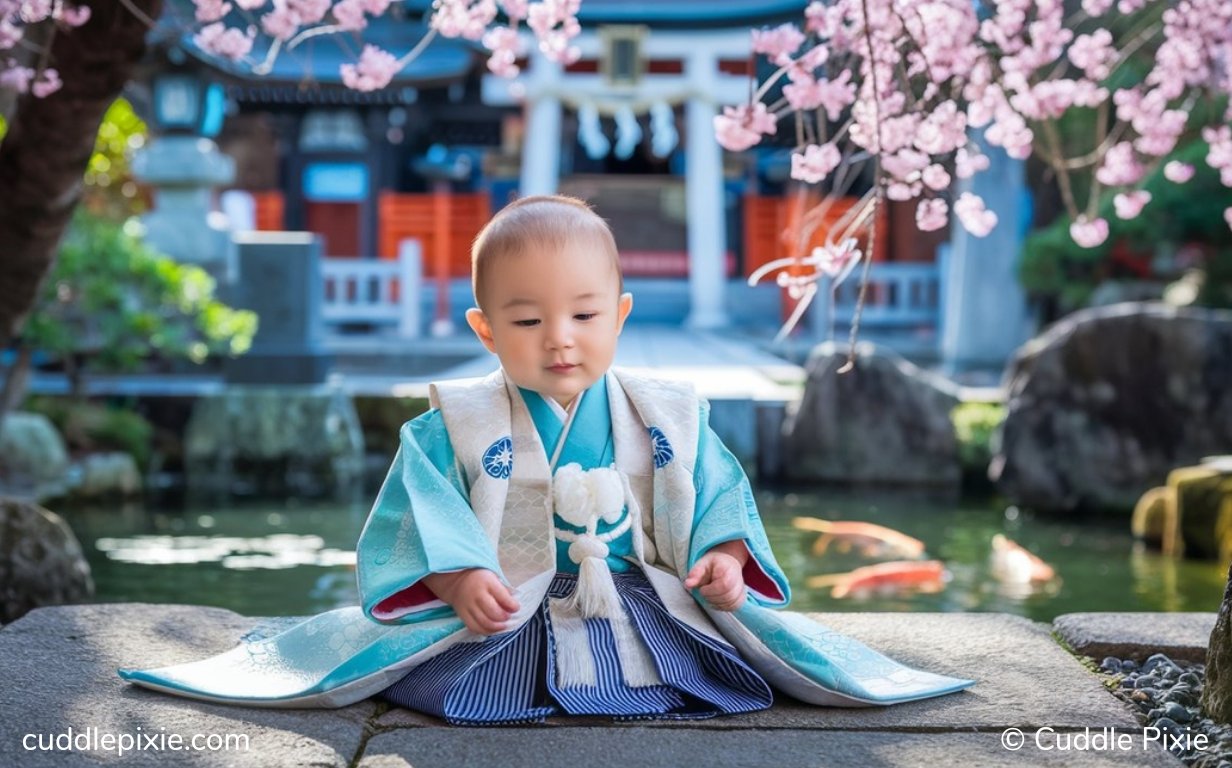Choosing a baby name is one of the most exciting and important tasks for new parents. For families looking to honor spiritual and cultural traditions, Shinto baby names offer a deep connection to nature, divine beings, and Japan’s ancient past. Rooted in the ancient religion of Shintoism, these names are more than just labels—they carry profound meanings linked to nature, spirituality, and the forces of life.
In this guide, we’ll explore timeless and unique Shinto baby names, their meanings, and cultural significance. Whether you’re seeking a traditional name from Japanese mythology or a modern Shinto-inspired choice, this article will provide you with a wealth of options and insights into this fascinating naming tradition.
In This Article
The Spiritual Roots of Shinto Baby Names
Shintoism is Japan’s oldest religion, deeply intertwined with the nation’s culture and history. The term “Shinto” means “the way of the gods,” and the religion centers around the worship of kami, which are divine spirits or gods believed to inhabit natural elements like rivers, mountains, trees, and even the wind. The Shinto faith places immense emphasis on harmony with nature, reverence for ancestral spirits, and rituals that maintain purity and balance in life.
Shinto baby names often reflect this connection to the natural world and spiritual beliefs. These names are more than just identifiers—they are seen as a way to bestow a child with blessings from the kami, offering protection and prosperity throughout their lives. For example, a name like Hikaru, meaning “light” or Aoi, which refers to the hollyhock flower, reflects this profound connection to nature.
The practice of choosing a baby name in Shinto culture often involves rituals to ensure the name brings good fortune and aligns with the spiritual forces surrounding the child’s birth. These names are not chosen lightly; they carry the essence of life itself, imbued with the power and protection of the kami.
Popular Shinto Baby Names and Their Meanings
Shinto baby names can range from those steeped in tradition to more modern interpretations influenced by contemporary culture. Below, we’ll explore popular names for boys, girls, and unisex options, with their meanings.
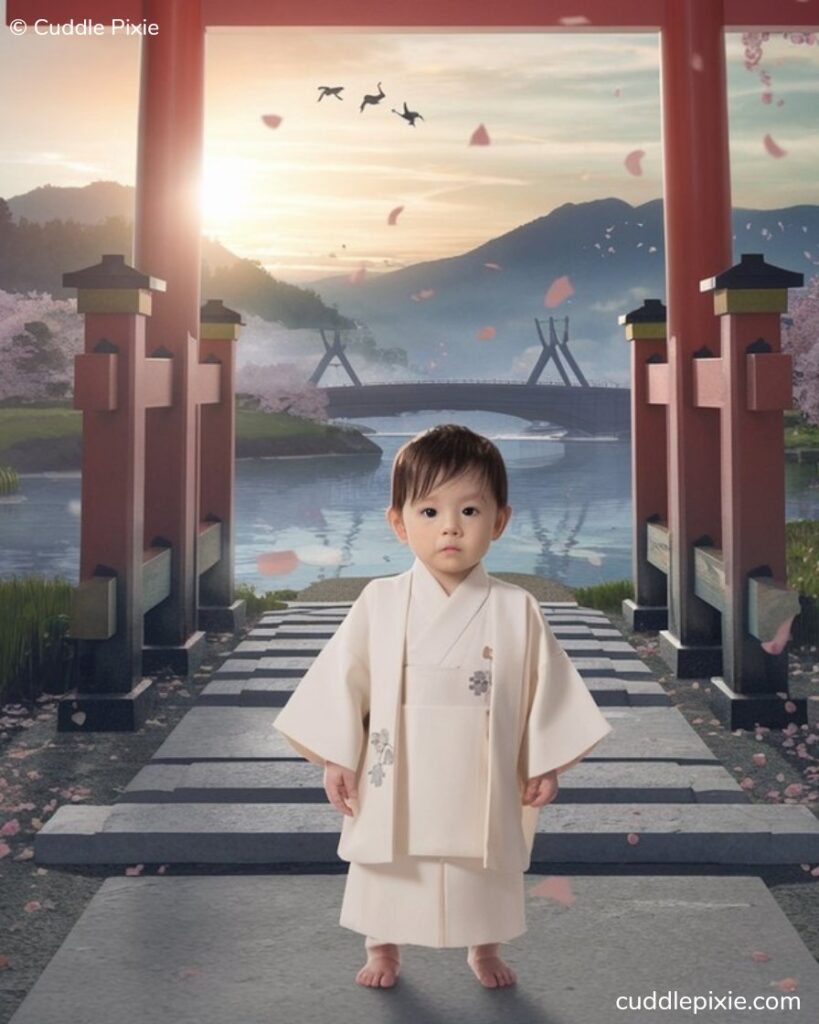
Popular Shinto Baby Names for Boys
These names are deeply rooted in Shinto beliefs, often symbolizing purity, strength, and harmony with nature and spiritual forces.
- Akio – Meaning “bright” or “man,” this name reflects the qualities of a bright and noble person.
- Daiki – Symbolizes “great glory” or “great brightness,” often associated with future success.
- Haruto – Meaning “sunlight” or “soar,” it suggests a child destined for greatness and warmth.
- Hikaru – This name means “light” or “radiance,” representing a child who brings brightness to others.
- Isamu – Meaning “courage” or “bravery,” it signifies a strong and valiant spirit.
- Kaito – Combining “ocean” and “soar,” this name evokes the imagery of freedom and adventure.
- Kazuki – Meaning “hope” or “harmony,” it’s a name linked with peace and a bright future.
- Keisuke – Meaning “blessed” or “assist,” this name suggests a helpful and fortunate nature.
- Masato – Meaning “righteous” or “proper,” it reflects integrity and moral strength.
- Nobu – This name signifies “trust” or “faith,” perfect for a dependable and loyal child.
- Ren – Meaning “lotus” or “love,” it symbolizes purity, beauty, and affection.
- Riku – Refers to “land” or “earth,” representing a grounded and stable character.
- Sora – Meaning “sky,” this name is linked with open-mindedness and freedom.
- Takashi – This name means “noble” or “prosperous,” reflecting a child destined for success.
- Tatsuya – Meaning “becoming a dragon,” it represents strength and a powerful future.
- Tomoya – Meaning “wise” or “intelligent,” it signifies a child blessed with knowledge.
- Yamato – Meaning “great harmony,” this name reflects peace and unity.
- Yoshiro – Meaning “righteous” or “good son,” this name is associated with honesty and virtue.
- Takeru – Meaning “warrior” or “brave man,” it symbolizes strength and bravery.
- Shin – Meaning “truth” or “faith,” it reflects honesty and trustworthiness.
- Hiroshi – This name means “generous” or “tolerant,” representing kindness and understanding.
- Kiyoshi – Meaning “pure” or “clear,” this name suggests innocence and clarity.
- Makoto – Meaning “truth” or “sincerity,” it reflects a loyal and honest character.
- Masaru – Meaning “victory” or “success,” this name is perfect for a child destined to achieve great things.
- Noriaki – Meaning “glory of the law,” it symbolizes adherence to principles and honor.
- Rei – Meaning “spirit” or “gratitude,” it reflects a spiritual and thankful nature.
- Shigeru – Meaning “luxuriant” or “flourishing,” it represents prosperity and abundance.
- Susumu – Meaning “progress” or “advance,” it suggests a future full of growth and development.
- Tadashi – Meaning “loyal” or “faithful,” it reflects a strong sense of duty and honor.
- Yori – Meaning “trust” or “reliability,” it symbolizes a dependable and trustworthy individual.
- Tsubasa – Meaning “wings,” this name suggests freedom, ambition, and the ability to soar.
- Eiji – Meaning “eternity” or “prosperity,” it reflects a long-lasting and successful future.
- Kenshin – Meaning “modest” or “truthful,” this name reflects humility and honesty.
- Naoki – Meaning “honest” or “straight tree,” it symbolizes strength and integrity.
- Ryota – Meaning “refreshing” or “great,” this name suggests a calm and impactful personality.
- Sho – Meaning “to fly” or “to soar,” it reflects ambition and a free spirit.
- Taichi – Meaning “large” or “one,” it represents unity and greatness.
- Yuji – Meaning “courageous” or “second son,” it reflects strength and bravery.
- Zen – Meaning “quiet” or “meditative,” this name is associated with peace and calmness.
- Kouki – Meaning “light” or “hope,” it suggests a future full of brightness and promise.
- Raiden – Meaning “thunder god,” it evokes power and a commanding presence.
- Shota – Meaning “big flying,” it reflects strength and the ability to rise above challenges.
- Kyo – Meaning “cooperation” or “capital,” it signifies unity and importance.
- Hayato – Meaning “falcon person,” this name symbolizes sharpness and a soaring spirit.
- Ryu – Meaning “dragon,” this powerful name suggests strength and nobility.
- Toru – Meaning “transparent” or “penetrating,” it represents clarity and insight.
- Yuuta – Meaning “gentle” or “great,” this name reflects a kind and remarkable character.
- Jiro – Meaning “second son,” it is traditionally given to the second-born son in the family.
- Kazuo – Meaning “peaceful man,” it reflects a calm and harmonious nature.
- Seiji – Meaning “lawful” or “just,” it symbolizes fairness and righteousness.
Popular Shinto Baby Names for Girls
These names carry deep spiritual significance, reflecting Shinto beliefs about nature, beauty, purity, and the connection between the divine and the earthly.
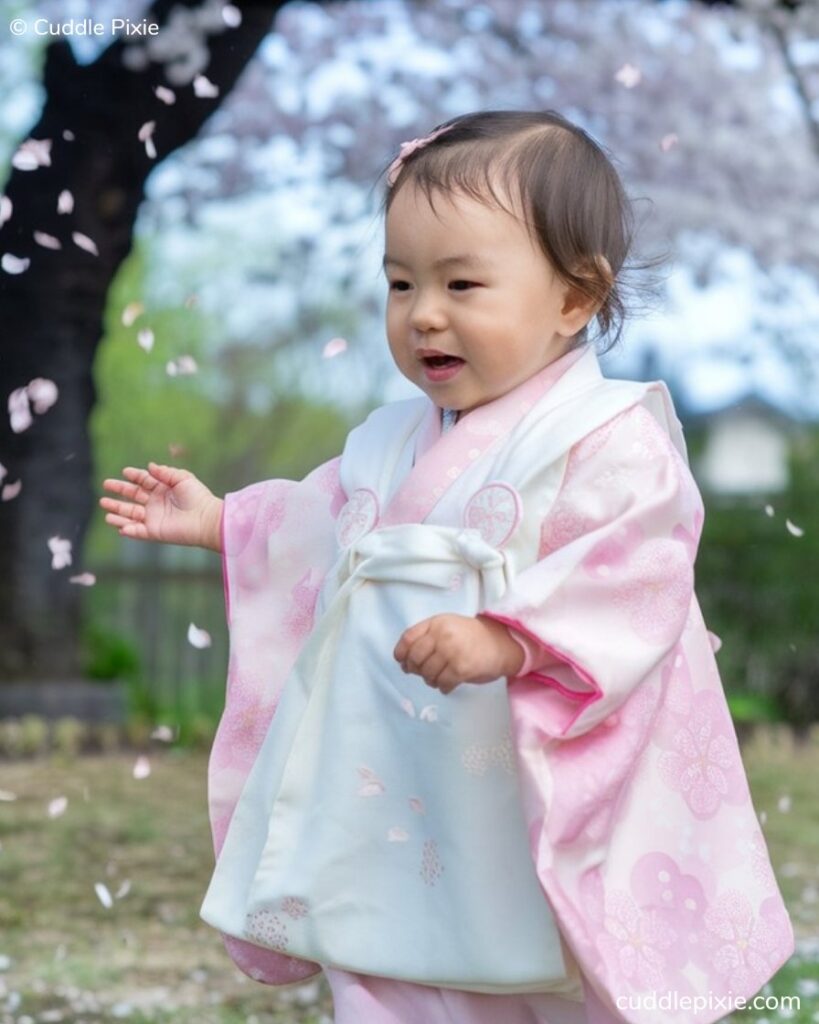
- Aiko – Meaning “beloved child,” it represents love and affection.
- Akemi – Meaning “bright beauty,” it symbolizes intelligence and charm.
- Ayame – Refers to the “iris flower,” representing elegance and grace.
- Chihiro – Meaning “thousand questions” or “abundance,” it suggests curiosity and wisdom.
- Eiko – Meaning “prosperous” or “flourishing,” it symbolizes a successful future.
- Emi – Meaning “beautiful blessing,” this name reflects joy and beauty.
- Fumiko – Meaning “child of abundant beauty,” it signifies elegance and wisdom.
- Hana – Meaning “flower,” it represents beauty and blooming potential.
- Haruka – Meaning “distant” or “spring,” it reflects serenity and warmth.
- Hikari – Meaning “light” or “radiance,” it symbolizes brightness and positivity.
- Hina – Meaning “sun” or “greens,” it evokes nature and vitality.
- Ichika – Meaning “one thousand flowers,” it represents beauty and uniqueness.
- Izumi – Meaning “fountain” or “spring,” it reflects a fresh and flowing personality.
- Kaede – Meaning “maple tree,” it symbolizes strength and natural beauty.
- Kanna – Meaning “summer waves,” it evokes warmth and calmness.
- Katsumi – Meaning “victorious beauty,” it symbolizes strength combined with grace.
- Keiko – Meaning “blessed” or “respectful child,” it reflects kindness and wisdom.
- Kiyomi – Meaning “pure beauty,” this name is linked with innocence and grace.
- Maki – Meaning “true hope,” it symbolizes faith and aspiration.
- Mao – Meaning “dance” or “flower,” it represents movement and beauty.
- Mayumi – Meaning “true gentle beauty,” it reflects kindness and elegance.
- Mei – Meaning “bud” or “sprout,” it symbolizes growth and potential.
- Michiko – Meaning “child of wisdom,” it reflects intelligence and insight.
- Midori – Meaning “green,” it symbolizes nature and renewal.
- Mika – Meaning “beautiful fragrance,” it represents beauty and charm.
- Mio – Meaning “beautiful cherry blossom,” it reflects elegance and grace.
- Misaki – Meaning “beautiful blossom” or “blooming,” it symbolizes beauty and vitality.
- Nanami – Meaning “seven seas,” it reflects vastness and exploration.
- Naoko – Meaning “obedient child” or “honest,” it represents sincerity and integrity.
- Nozomi – Meaning “hope” or “wish,” it reflects optimism and faith.
- Reiko – Meaning “grateful” or “lovely child,” it reflects gratitude and charm.
- Rika – Meaning “fragrance” or “village,” it symbolizes beauty and simplicity.
- Rin – Meaning “dignified” or “cold,” it reflects a strong and composed personality.
- Sakura – Refers to “cherry blossom,” symbolizing beauty and the fleeting nature of life.
- Sana – Meaning “calm” or “serene,” it represents tranquility and peace.
- Satomi – Meaning “beautiful” or “wise,” it reflects a balance of intelligence and grace.
- Shiori – Meaning “bookmark” or “guide,” it symbolizes guidance and wisdom.
- Sora – Meaning “sky,” it reflects freedom and vastness.
- Suzume – Meaning “sparrow,” it represents energy and liveliness.
- Takara – Meaning “treasure,” it symbolizes something precious and valued.
- Tomomi – Meaning “beautiful friend,” it represents loyalty and kindness.
- Tsubaki – Meaning “camellia flower,” it symbolizes beauty and purity.
- Umeko – Meaning “plum blossom child,” it reflects strength and beauty.
- Yoko – Meaning “positive child” or “sunshine,” it symbolizes brightness and warmth.
- Yoshiko – Meaning “good child” or “righteous,” it reflects virtue and integrity.
- Yua – Meaning “binding love,” it represents affection and strong bonds.
- Yuki – Meaning “snow” or “happiness,” it symbolizes purity and joy.
- Yume – Meaning “dream,” it reflects aspirations and hope.
- Yuri – Meaning “lily,” it symbolizes purity and innocence.
- Yuzuki – Meaning “gentle moon,” it evokes serenity and light.
Popular Unisex Shinto Baby Names
These unisex names draw inspiration from nature, harmony, and traditional virtues, reflecting core values of balance, peace, and beauty found in Shinto beliefs.
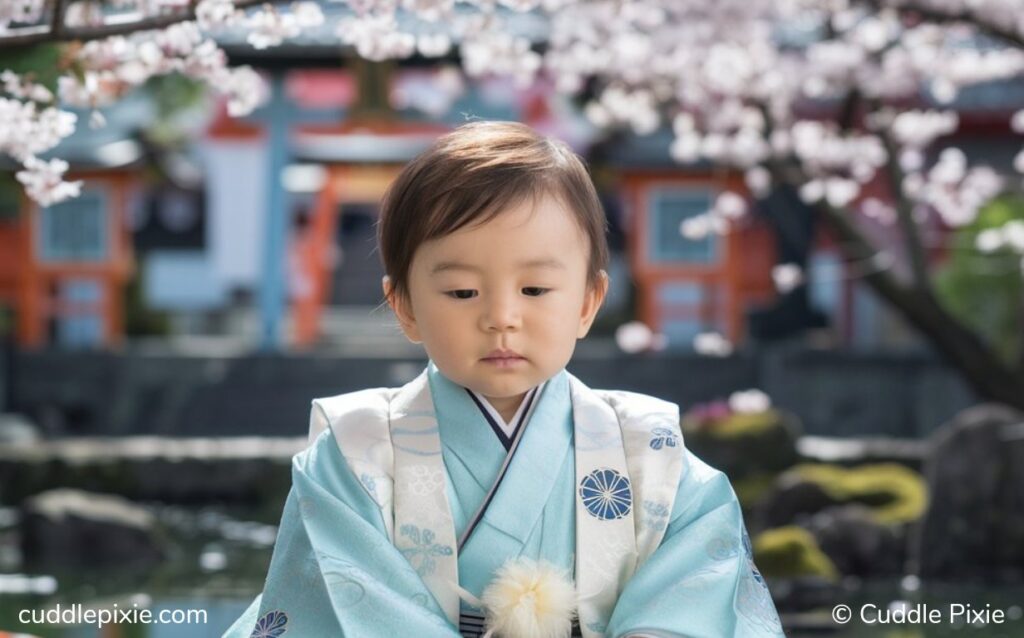
- Asahi – Meaning “morning sun,” it symbolizes brightness and new beginnings.
- Chika – Meaning “near” or “wisdom,” it reflects intelligence and insight.
- Ei – Meaning “prosperity” or “eternal,” it symbolizes a lasting success.
- Fumi – Meaning “history” or “letter,” it reflects knowledge and communication.
- Haru – Meaning “spring” or “sunlight,” it symbolizes renewal and warmth.
- Hibiki – Meaning “sound” or “echo,” it reflects harmony and connection.
- Hino – Meaning “sun field,” it represents brightness and nature.
- Itsuki – Meaning “tree” or “timber,” it symbolizes strength and growth.
- Jun – Meaning “pure” or “obedient,” it reflects clarity and virtue.
- Kaoru – Meaning “fragrance,” it symbolizes beauty and a gentle spirit.
- Kazu – Meaning “harmony” or “peace,” it reflects balance and serenity.
- Kiyo – Meaning “pure” or “clean,” it represents innocence and clarity.
- Kohaku – Meaning “amber,” it reflects warmth and timeless beauty.
- Masa – Meaning “correct” or “just,” it symbolizes righteousness and order.
- Masumi – Meaning “true clarity,” it reflects purity and straightforwardness.
- Michiru – Meaning “to be full,” it symbolizes completeness and fulfillment.
- Minori – Meaning “truth” or “harvest,” it reflects sincerity and abundance.
- Mizuki – Meaning “beautiful moon” or “water tree,” it symbolizes serenity and nature.
- Nagisa – Meaning “shore” or “beach,” it reflects tranquility and a calm spirit.
- Nao – Meaning “honest” or “docile,” it symbolizes simplicity and sincerity.
- Natsu – Meaning “summer,” it reflects warmth, vibrancy, and energy.
- Renka – Meaning “lotus flower,” it symbolizes purity and beauty.
- Reika – Meaning “lovely flower” or “splendid fragrance,” it reflects elegance and grace.
- Reina – Meaning “wise” or “calm,” it symbolizes clarity and inner strength.
- Rinzu – Meaning “silk” or “delicate,” it reflects softness and refinement.
- Ritsu – Meaning “law” or “regulation,” it reflects order and discipline.
- Saki – Meaning “blossom” or “hope,” it symbolizes new beginnings and growth.
- Satsuki – Meaning “fifth month” or “early summer,” it represents renewal and vitality.
- Shinobu – Meaning “endurance” or “patience,” it symbolizes strength through persistence.
- Shion – Meaning “purple flower” or “remembrance,” it reflects beauty and memories.
- Shizuka – Meaning “quiet” or “calm,” it symbolizes tranquility and peace.
- Suzu – Meaning “bell” or “chime,” it reflects clarity and a joyful spirit.
- Taki – Meaning “waterfall,” it symbolizes strength and the power of nature.
- Takumi – Meaning “artisan” or “skillful,” it represents creativity and craftsmanship.
- Tamaki – Meaning “jewel” or “treasure,” it symbolizes something precious and valued.
- Tomo – Meaning “friend” or “wisdom,” it reflects loyalty and intelligence.
- Tsubasa – Meaning “wings,” it represents freedom, ambition, and the ability to soar.
- Wakana – Meaning “harmony” or “music,” it symbolizes balance and creativity.
- Yasu – Meaning “peace” or “calm,” it reflects serenity and balance.
- Yori – Meaning “reliable” or “trustworthy,” it symbolizes a dependable nature.
- Yukiho – Meaning “snowy ear of grain,” it reflects beauty and growth in nature.
- Yura – Meaning “to bind” or “tie together,” it symbolizes connection and unity.
- Yuuma – Meaning “truthful” or “gentle,” it reflects kindness and sincerity.
- Ayumu – Meaning “walk” or “dream,” it symbolizes progress and aspirations.
- Chitose – Meaning “thousand years,” it reflects longevity and enduring strength.
- Kanon – Meaning “flower sound,” it symbolizes beauty and harmony.
- Kazuna – Meaning “harmony” or “peace,” it reflects unity and tranquility.
- Koharu – Meaning “small sun” or “late summer,” it symbolizes warmth and brightness.
- Manami – Meaning “love of the sea” or “beautiful affection,” it reflects nurturing and kindness.
- Soma – Meaning “sudden truth” or “swift reality,” it reflects clarity and insight.
Unique Shinto Names from Japanese Mythology
Many Shinto baby names have origins in Japanese mythology, particularly names inspired by kami, the divine spirits worshiped in Shintoism. These names not only carry spiritual significance but also tell stories of the gods and their influence on the world.
Mythological Shinto Names for Boys
These names draw from Shinto mythology and folklore, representing various aspects of nature, deities, and legendary heroes, and embodying values such as strength, wisdom, and beauty.
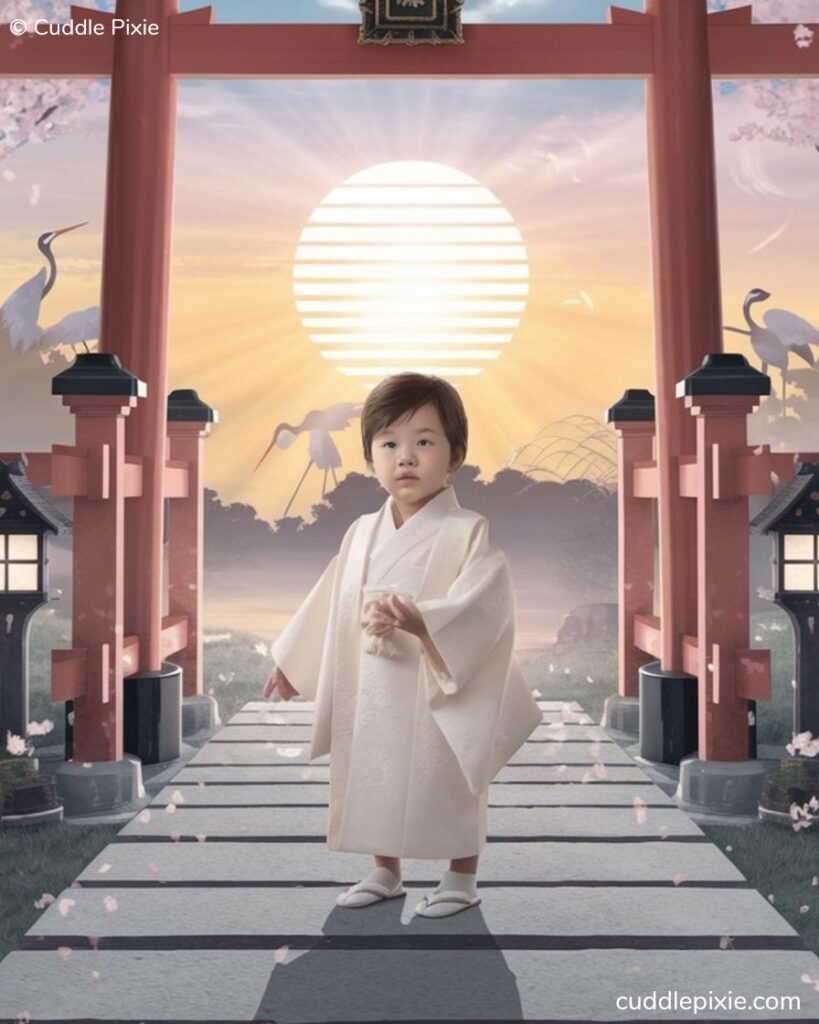
- Amaterasu – The sun goddess and one of the principal deities in Shinto, representing light and the power of the sun.
- Susanoo – The god of storms and the sea, known for his strength and adventurous spirit, often associated with conflict and protection.
- Tsukuyomi – The moon god, symbolizing the beauty and mystery of the night, often associated with calmness and reflection.
- Raijin – The god of thunder, lightning, and storms, known for his fierce nature and power to bring storms and rain.
- Fūjin – The god of wind, often depicted carrying a bag of winds, representing the forces of nature and change.
- Hachiman – The god of war and the divine protector of Japan, embodying the principles of loyalty and valor.
- Inari – The deity of rice, agriculture, and prosperity, often associated with foxes and representing abundance and fertility.
- Yamato Takeru – A legendary prince known for his bravery and strength in battle, embodying the ideal warrior spirit.
- Omoikane – The deity of wisdom and intelligence, known for his ability to provide counsel and solve problems.
- Kagutsuchi – The god of fire, symbolizing both destruction and renewal, representing the duality of fire’s nature.
- Jizo – A deity who protects travelers and children, embodying compassion and safety during journeys.
- Tenjin – The god of learning and scholarship, revered by students for wisdom and success in education.
- Benten – The goddess of music, art, and wisdom, often associated with beauty and the arts.
- Tengu – Supernatural creatures often depicted as bird-like beings, known for their martial arts skills and connection to nature.
- Kappa – Water-dwelling creatures known for their mischievous nature and trickery, often seen as guardians of rivers and ponds.
- Hōri – A mythical fisherman known for his bravery and adventures, representing the spirit of exploration.
- Mikazuki – Meaning “crescent moon,” it represents the beauty and tranquility of the night sky.
- Oni – Demonic creatures from folklore, often embodying chaos and mischief, but can also represent protection in some tales.
- Yuki-onna – The snow woman, a spirit associated with winter and cold, embodying both beauty and danger.
- Kagura – The god of music and dance, representing joy and celebration in Shinto rituals.
- Kishi – The god of lightning, representing both the destructive and cleansing aspects of storms.
- Tachigawa – A legendary warrior who represents bravery and heroism in battle, embodying the spirit of the samurai.
- Izanagi – The creator god who, along with Izanami, gave birth to the islands of Japan and various deities, symbolizing creation and unity.
- Izanami – The goddess of creation and death, who represents the cycle of life and the afterlife.
- Yamata no Orochi – The eight-headed dragon defeated by Susanoo, symbolizing strength and the triumph of good over evil.
- Fujin – The wind god, often depicted with a bag of winds, symbolizing the power and unpredictability of nature.
- Shinto – A deity associated with the divine path, representing spirituality and the connection between heaven and earth.
- Kofun – A legendary hero known for his cunning and cleverness, embodying the qualities of intelligence and resourcefulness.
- Taira no Kiyomori – A historical figure who became a legendary warrior, representing strength and loyalty.
- Kuroko – Mythical black figures that assist in traditional theater, representing the unseen help and support.
- Tsumuji – A mythical figure associated with weaving, representing creativity and craftsmanship.
- Kushinada – The wife of Susanoo, representing loyalty and love in the face of adversity.
- Takeminakata – The god of agriculture and warfare, symbolizing strength and prosperity.
- Ninigi – The grandson of Amaterasu, who descended to earth to rule, representing divine guidance and leadership.
- Ame-no-Murakumo – The sword of Susanoo, symbolizing power and victory in battle.
- Kagutsuchi – The fire god, representing both the destructive and life-giving aspects of fire.
- Tateyama – The god of mountains, embodying strength and protection over the lands.
- Kannon – The bodhisattva of compassion, representing mercy and kindness.
- Ryu – The dragon god, symbolizing power, authority, and the natural world’s forces.
- Daikokuten – The god of wealth and commerce, embodying prosperity and abundance.
- Bishamonten – The god of war and warriors, symbolizing protection and bravery in battle.
- Shōtoku – A historical prince known for his promotion of Buddhism and governance, representing wisdom and leadership.
- Kibi no Makibi – A legendary figure known for his intelligence and wisdom, symbolizing scholarship and learning.
- Kūjin – The guardian spirit of the mountains, representing strength and protection of the natural world.
- Ame-no-Tajikarao – The deity who helped Amaterasu emerge from a cave, symbolizing strength and assistance in times of need.
- Taira – A name associated with strength and warrior spirit, often linked to noble families in history.
- Mizuki – Meaning “water moon,” this name symbolizes calmness and serenity.
- Yorimitsu – A legendary warrior, embodying loyalty and the spirit of the samurai.
- Masamune – The legendary swordsmith, representing craftsmanship and precision in artistry.
- Hizume – Meaning “day of the sun,” it symbolizes brightness and the beginning of new ventures.
Mythological Shinto Names for Girls
These names are inspired by mythological figures, natural elements, and Shinto beliefs, embodying various virtues and qualities that are cherished in Japanese culture.
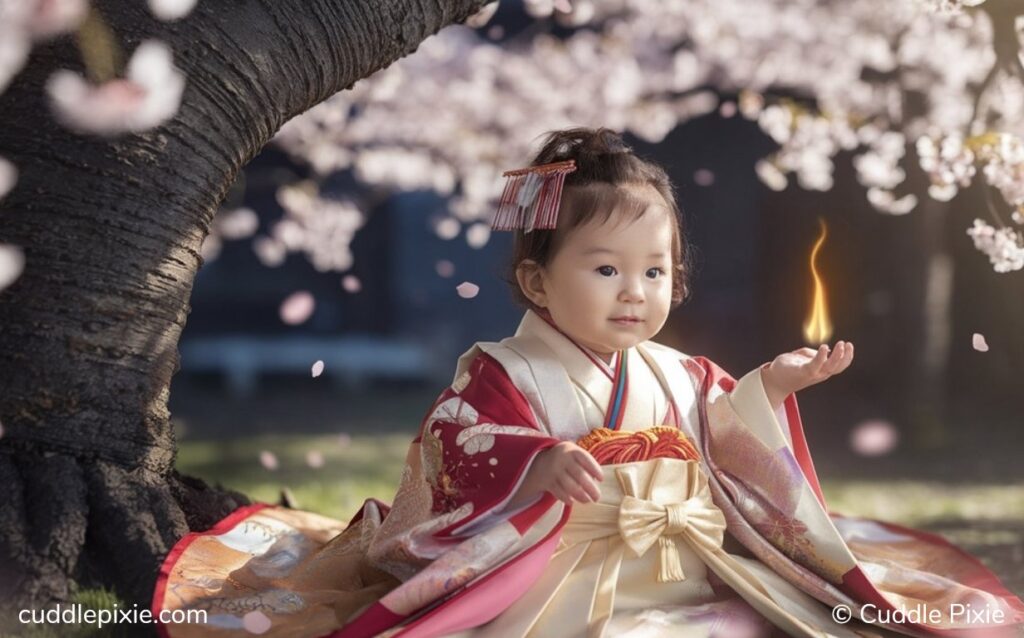
- Ame-no-Uzume – The goddess of dawn and revelry, known for her joyful spirit and ability to bring light and happiness to the world.
- Inari – A deity associated with rice, fertility, and agriculture, often depicted with foxes as her messengers.
- Kannon – The bodhisattva of compassion and mercy, representing love and understanding for all beings.
- Omoikane – A goddess of wisdom and intelligence, known for her insightful guidance and problem-solving abilities.
- Amaterasu – The sun goddess who brings light and warmth, embodying radiance and hope in the world.
- Yuki-onna – The snow woman spirit, known for her beauty and ethereal presence in winter folklore, embodying both grace and danger.
- Kagura – The goddess of music and dance, symbolizing joy and celebration in Shinto rituals.
- Tamamo-no-Mae – A mythical nine-tailed fox known for her beauty and cunning, representing the duality of nature.
- Hina – The goddess associated with the sun and warmth, representing life and nurturing qualities.
- Mizuko – A name meaning “water child,” symbolizing purity and the connection to water spirits.
- Kuni no Tokusai – A goddess associated with the earth, representing fertility and the nurturing aspects of nature.
- Kotoamatsukami – The deities of creation and harmony, representing the interconnectedness of all life.
- Tachiwaki – The goddess of the harvest, symbolizing abundance and the rewards of hard work.
- Hime – Meaning “princess,” this name represents beauty, grace, and nobility.
- Kaguya – A legendary moon princess known for her beauty and mystery, symbolizing the enchanting allure of the night.
- Mizuhime – Meaning “water princess,” this name embodies purity and the tranquil qualities of water.
- Yamato-hime – A goddess associated with the divine will of the Emperor, representing leadership and grace.
- Fujin – The goddess of wind, representing freedom and the power of nature.
- Sakurahime – Meaning “cherry blossom princess,” this name symbolizes beauty, delicacy, and the transient nature of life.
- Uka-no-Mitama – The goddess of agriculture and food, representing sustenance and nourishment for the people.
- Kiyohime – A legendary figure who transformed into a serpent, representing love and devotion.
- Tsubaki – Meaning “camellia,” this name symbolizes beauty and the transient nature of life.
- Yoshino – Meaning “good fortune,” this name embodies prosperity and happiness.
- Tamayori-hime – The goddess of childbirth and fertility, representing nurturing and maternal qualities.
- Mikage – A goddess of harvest and grain, symbolizing abundance and nourishment.
- Sayuri – Meaning “small lily,” this name symbolizes purity, innocence, and beauty.
- Ame-no-Koyomi – The goddess of the calendar and time, representing the passage of seasons and life.
- Kaguya-hime – The moon princess from “The Tale of the Bamboo Cutter,” representing beauty and mystery.
- Kishimojin – A goddess of fertility and motherhood, representing nurturing and protective qualities.
- Aoi – Meaning “hollyhock,” this name symbolizes beauty and natural grace.
- Hoshizora – Meaning “starry sky,” this name evokes the beauty and wonder of the cosmos.
- Yoshiko – Meaning “good child,” representing a pure and kind spirit.
- Ame-no-Tajikarao – The deity who helped Amaterasu emerge from the cave, symbolizing strength and assistance in times of need.
- Kikyo – Meaning “bellflower,” this name symbolizes beauty and a gentle spirit.
- Haruko – Meaning “spring child,” representing new beginnings and the beauty of nature.
- Kiyomi – Meaning “pure beauty,” symbolizing innocence and grace.
- Nagisa – Meaning “beach,” representing tranquility and the connection to nature.
- Hoshiko – Meaning “star child,” symbolizing brightness and potential.
- Tsukiko – Meaning “moon child,” representing calmness and beauty.
- Fujiko – Meaning “wisteria child,” symbolizing grace and beauty in nature.
- Reika – Meaning “pure flower,” representing beauty and purity.
- Matsuri – Meaning “festival,” symbolizing joy, celebration, and community spirit.
- Akiko – Meaning “bright child,” representing intelligence and cheerfulness.
- Kazumi – Meaning “harmony beauty,” symbolizing inner peace and grace.
- Rin – Meaning “bell,” representing clarity and harmony.
- Shizuku – Meaning “drop of water,” symbolizing purity and the essence of life.
- Yuriko – Meaning “lily child,” representing purity and innocence.
- Tsubaki – Meaning “camellia,” symbolizing beauty and elegance.
- Nozomi – Meaning “hope,” representing a bright and promising future.
- Yume – Meaning “dream,” symbolizing aspirations and the beauty of imagination.
By choosing a name from Shinto mythology, parents not only honor the divine but also imbue their child with the stories and powers of Japan’s ancient gods.
Modern Trends in Shinto Baby Naming
While traditional names rooted in Shintoism continue to be popular, modern influences have led to a blend of old and new in baby naming practices. Today, many parents choose names that are inspired by Shinto spirituality but are more accessible or aligned with contemporary trends.
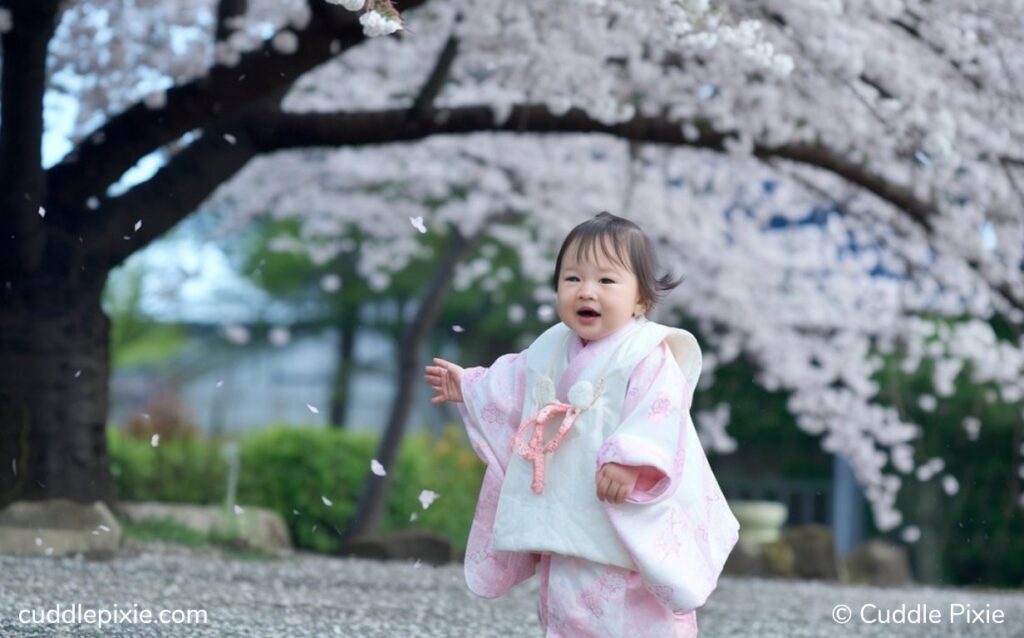
Girl Names
- Asami (Girl) – Meaning “morning beauty,” symbolizing freshness and new beginnings.
- Emiko (Girl) – Meaning “blessed child,” representing happiness and good fortune.
- Kikuko (Girl) – Meaning “chrysanthemum child,” symbolizing longevity and joy.
- Akemi (Girl) – Meaning “bright beauty,” representing radiance and elegance.
- Shiori (Girl) – Meaning “poem, guide,” symbolizing creativity and direction.
- Tsubasa (Girl) – Meaning “wings,” representing freedom and aspiration.
- Natsuko (Girl) – Meaning “summer child,” symbolizing warmth and vitality.
- Yasuko (Girl) – Meaning “peaceful child,” representing calmness and tranquility.
- Aiko (Girl) – Meaning “beloved child,” symbolizing love and affection.
- Riko (Girl) – Meaning “child of the village,” representing community and connection.
- Fujiko (Girl) – Meaning “wisteria child,” symbolizing grace and beauty.
- Maki (Girl) – Meaning “true hope,” representing optimism and sincerity.
- Chiyo (Girl) – Meaning “thousand generations,” symbolizing longevity and heritage.
- Hana (Girl) – Meaning “flower,” representing beauty and nature.
- Kayo (Girl) – Meaning “to bring joy,” symbolizing happiness and positivity.
- Seiko (Girl) – Meaning “child of the righteous,” representing virtue and integrity.
- Tomiko (Girl) – Meaning “child of wisdom,” symbolizing intelligence and insight.
- Reiko (Girl) – Meaning “gratitude child,” representing appreciation and thankfulness.
- Masumi (Girl) – Meaning “pure,” symbolizing clarity and innocence.
- Tina (Girl) – Meaning “small,” representing delicate beauty and grace.
Boy Names
- Kaito (Boy) – Meaning “ocean flying,” symbolizing adventure and exploration.
- Isamu (Boy) – Meaning “brave,” representing courage and valor.
- Haruto (Boy) – Meaning “sunlight,” symbolizing warmth and brightness.
- Yoshio (Boy) – Meaning “righteous man,” representing virtue and moral integrity.
- Hayato (Boy) – Meaning “falcon,” symbolizing speed and agility.
- Rikuya (Boy) – Meaning “land of the guardian,” representing stability and protection.
- Takuto (Boy) – Meaning “noble,” symbolizing honor and respect.
- Kensuke (Boy) – Meaning “strong and healthy,” representing vitality and resilience.
- Naoki (Boy) – Meaning “honest tree,” symbolizing strength and reliability.
- Shun (Boy) – Meaning “fast” or “talented,” representing agility and skill.
- Tadashi (Boy) – Meaning “loyal,” symbolizing faithfulness and dedication.
- Yukio (Boy) – Meaning “snow man,” representing calmness and purity.
- Kazuki (Boy) – Meaning “harmonious hope,” symbolizing positivity and balance.
- Mitsuo (Boy) – Meaning “shining hero,” representing strength and brilliance.
- Renji (Boy) – Meaning “young, strong,” symbolizing youth and vitality.
- Ryuu (Boy) – Meaning “dragon,” representing power and nobility.
- Kouji (Boy) – Meaning “the second son,” symbolizing continuity and family ties.
- Hikaru (Boy) – Meaning “light” or “radiance,” representing brightness and positivity.
- Keita (Boy) – Meaning “blessed,” symbolizing fortune and good luck.
- Jin (Boy) – Meaning “benevolence,” representing kindness and compassion.
Gender-Neutral Names
- Akira (Gender-Neutral) – Meaning “bright” or “clear,” representing intelligence and positivity.
- Mizuki (Gender-Neutral) – Meaning “beautiful moon,” symbolizing calmness and serenity.
- Yuki (Gender-Neutral) – Meaning “snow,” symbolizing purity and tranquility.
- Haru (Gender-Neutral) – Meaning “spring,” representing renewal and growth.
- Nao (Gender-Neutral) – Meaning “honest” or “straight,” symbolizing integrity and sincerity.
- Kōki (Gender-Neutral) – Meaning “radiant hope,” symbolizing brightness and optimism.
- Kou (Gender-Neutral) – Meaning “light,” representing positivity and hope.
- Tsubaki (Gender-Neutral) – Meaning “camellia,” representing beauty and resilience.
- Rin (Gender-Neutral) – Meaning “bell,” representing harmony and clarity.
- Chiyo (Gender-Neutral) – Meaning “thousand generations,” symbolizing longevity and heritage.
This list features modern Shinto-inspired names that embody various positive qualities and connections to nature, reflecting the essence of Shinto beliefs and values.
How to Choose a Shinto Baby Name
Choosing a baby name in the context of Shintoism is a deeply personal and spiritual experience. There are several factors to consider when selecting the perfect name:
- Spiritual Meaning: In Shinto culture, names often reflect the forces of nature or the divine. Parents should consider choosing a name that aligns with their hopes and aspirations for their child. Example: A name like Hikaru (light) could symbolize a bright future, while Ren (lotus) represents purity and spiritual growth.
- Connection to Nature: Many Shinto names are derived from natural elements such as the sun, sky, ocean, or plants. If nature plays a significant role in your life or values, a nature-inspired name could be a meaningful choice. Example: Kai (ocean) or Aoi (hollyhock flower).
- Kami Association: For parents who wish to honor a particular kami, choosing a name associated with a Shinto deity can imbue the child with the protection and blessings of that spirit. Example: Amaterasu (sun goddess) or Susanoo (storm god).
- Season of Birth: In Japan, the season in which a child is born often influences the name. Shinto names can reflect the time of year, such as Haru (spring) or Natsuki (summer hope).
Pronunciation Guide for Shinto Baby Names
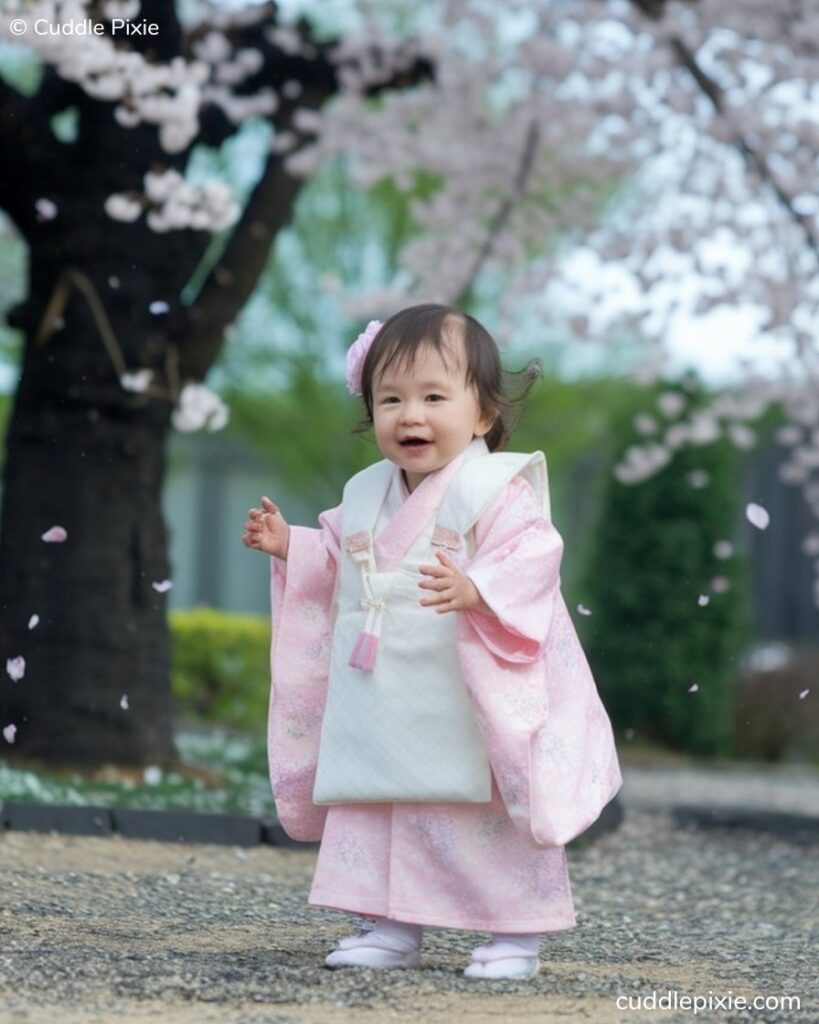
For non-Japanese speakers, pronouncing Shinto names correctly can be a challenge, but it’s important to honor the cultural significance by learning the correct phonetics. Here are a few tips:
-
Vowels: Japanese vowels are typically pronounced as follows:
- A = “ah” (as in “car”)
- E = “eh” (as in “bed”)
- I = “ee” (as in “see”)
- O = “oh” (as in “go”)
- U = “oo” (as in “food”)
- Consonants: Most consonants are similar to English, but the “r” sound in Japanese is pronounced with a slight flick of the tongue, somewhere between an “r” and an “l.”
By practicing the correct pronunciation, you can ensure that the name you choose is not only meaningful but also respectful of its cultural origins.
Final Thoughts
Choosing a Shinto baby name is a meaningful way to honor Japan’s rich spiritual and cultural heritage. These names, often derived from nature, mythology, and the divine spirits of Shintoism, carry deep significance and are imbued with spiritual blessings. Whether you’re drawn to traditional names rooted in ancient myths or modern names that reflect contemporary sensibilities, there’s a Shinto name that’s perfect for your baby.
As you embark on this journey of naming your child, remember to consider the spiritual, cultural, and personal significance of the name you choose. In doing so, you’ll not only give your child a beautiful name but also a deep connection to the divine forces that shape the world.
